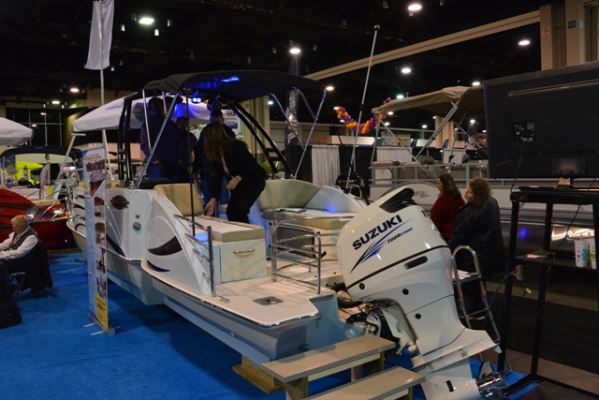.JPG_600.jpg) In my job, I go to a lot of shows around the country. My attendance is twofold: ideas for my columns and contacts for my insurance business. If you didn’t know, I have a specialty insurance agency that sells “toy” insurance, Wings, Wheels and Water. I insure airplanes, custom cars (and motorcycles) and boats and have been at it since 1985.
In my job, I go to a lot of shows around the country. My attendance is twofold: ideas for my columns and contacts for my insurance business. If you didn’t know, I have a specialty insurance agency that sells “toy” insurance, Wings, Wheels and Water. I insure airplanes, custom cars (and motorcycles) and boats and have been at it since 1985.
Since I do business in 48 states I like to go to shows. It gives me a chance to meet customers, new people and see what my industries are like around the country. I have flown aircraft and boated all over including sailing out of Everett, Wash., and on a Maine Cat 30 sea trial in Florida. I also spent a day on a Venture 222 sailboat in Lake Winnebago and a long evening on a Sea Ray 34 on the Intracoastal near St Pete. Okay, you get the picture.
And it’s that time of year again, the boat show season. If you are like me, some of my basic common sense gets left at the door of the boat show. That means I am prone to “emotional” purchase decisions. When you get into the “show spirit” you often make decisions that maybe you should not have, not saying that has ever happened to me.
.JPG_600.jpg) Reason I bring this up is that everywhere I go there are different needs in boats, equipment, and of course, insurance.
Reason I bring this up is that everywhere I go there are different needs in boats, equipment, and of course, insurance.
Okay, you are probably thinking, “Do I even need to buy insurance?” Not really. You can go uninsured and hope nothing happens. That’s part of your risk management decision. You can decide to take on all the risk. If it’s a canoe, I’d probably call my homeowners company and see if they will cover the liability as part of my homeowner’s policy. Bodily injury and property damage liability to a third party is probably the most important thing anyway.
Buying a boat is a fixed cost. If my $20,000 boat sinks, I am out the boat and the money I invested, but that’s all. But if my boat crashed into another boat and they both sink, that’s a different story. Third party liability is the coverage you need in that situation.
Anyway, construction, performance, size, cost and operator experience are a few things that affect insurance. Aluminum and fiberglass are the “normal” boats, which makes steel and wood boats harder to insure and they usually have higher premiums.
.JPG_600.jpg) Big boats for new buyers are also harder to insure. What makes a big boat? Varies, but usually 26 feet is considered “big.”
Big boats for new buyers are also harder to insure. What makes a big boat? Varies, but usually 26 feet is considered “big.”
On a side note, the National Marine Manufacturers Association (NMMA) report released January 2017 states that “Ninety-five percent of boats on the water (powerboats, personal watercraft, and sailboats) in the U.S. are small in size at less than 26 feet in length, boats that can be trailered by a vehicle to local waterways.”
That is a cool fact. Because at the boat show we usually see the biggest and fanciest boats on display, yet the money makers are the everyday trailerable boats.
What about pontoons? `Toons are pretty easy and reasonable to insure. Two or three tubes, no big deal. Biggest issue will probably be your location and the value of the boat. Coastal locations with named storms will be reflected in the cost of the insurance (meaning higher premiums). Based in the water or on shore is another.
Even with those issues, pontoon insurance is relatively inexpensive, costing a couple hundred dollars and up. Yes, the engine size (and number) and performance can affect the premium, but it’s not usually as bad as a performance V-hull or catamaran.
 If you are a new buyer buying a pontoon in the 26-foot plus length you shouldn’t have too much trouble. But buying a 34-foot performance catamaran with twin 400 horsepower outboards probably won’t be easy and definitely not cheap to insure. And the same can be true of a high performance pontoon. A 32-footer with two or three 400hp outboards, might require a special policy and experience.
If you are a new buyer buying a pontoon in the 26-foot plus length you shouldn’t have too much trouble. But buying a 34-foot performance catamaran with twin 400 horsepower outboards probably won’t be easy and definitely not cheap to insure. And the same can be true of a high performance pontoon. A 32-footer with two or three 400hp outboards, might require a special policy and experience.
So before you head to the show and commit to the boat purchase, think about insurance and get a quote for what you want before you go to the show. Having a quote helps if you are trying to make the decision to buy. It might not be the same premium as the boat you buy, but at least you can use the number to help you decide.

